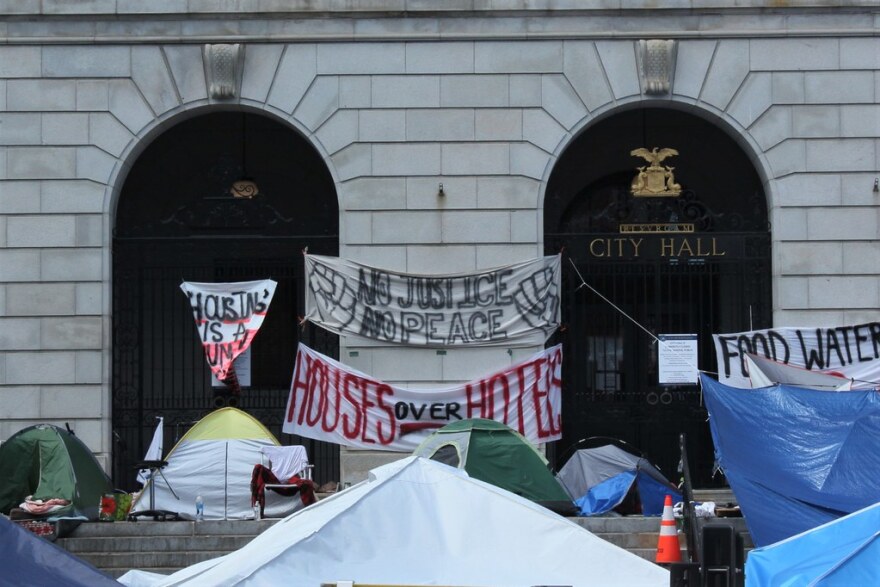Portland city officials struggled Monday night to devise a strategy to help protesters lacking shelter to leave an encampment at City Hall plaza - an effort some said has gained urgency with a tropical storm heading towards Maine.The protesters started their occupation of City Hall almost two weeks ago, demanding attention to the needs of the homeless.
At last night's online City Council meeting, Councilor Spencer Thibodeau said he supports their right to protest. But he says with recent arrests for sexual assault and other disturbances there, and an apparent lack of mask-wearing, public health and safety concerns are growing acute.
"I also want to put myself in the 'seek immediate shelter now' bin," Thibodeau said. "I do believe that every person there now who is unhoused, I would like to find a way to get them into one of our half-full shelters or some other accommodation as soon as humanly possible."

The city's director of health and human services says information compiled by social service agencies indicates that of the roughly 60 people staying at the site overnight, 10 currently lack access to shelter. The rest either have permanent housing, or have access to temporary housing at shelters and hotel placements.
City manager Jon Jennings says he is working on a plan to manage the encampment and get to its dispersal. But some councilors and members of the public warned that the city's homeless can face the same vulnerabilities and lack of safety whether they are camped in the high-profile plaza, or dispersed to more marginal areas.
Councilor Kimberly Cook warned against acting to simply "clear the plaza."
"The reality is these people have been here and needing services, whether it is something the city can provide, or is a much broader net of what can be provided," Cook said. "But it is not something that we want to push people to camping in the woods all around our city. That's not going to serve them and it's not going to serve our residents."

One leader of the protest, Jes Falero, said by text message that protesters are not inclined to leave until the city meets their demands, which include decriminalizing camping out in the city and creating a new substance abuse center. Falero added that the group is not daunted by a little weather.
One of the most immediate concerns raised at the meeting was the availability of rest rooms near the encampment. Jennings said he was working with Portland Downtown, a non-profit civic organization, to try to secure and service portable toilets.
He added though, that the city's budget is under stress due to the pandemic - taking a $12 million hit -- and as many as 60 staff layoffs may be in the offing.
Meanwhile, some of the protesters say they are in it for the long haul. Cody Taylor told the Council that the city must commit to better services for the homeless and addicted, decriminalize camping in the city, and reduce police budgets.
"I want to state that we are not moving our encampment," he said. "We are not moving our encampment until our demands are met."
One local resident who called into the Council's online meeting had a different view. He said the councilors should stop letting the protesters "hold the city hostage," and disband the protest.
The council did not take any action regarding the protest.



